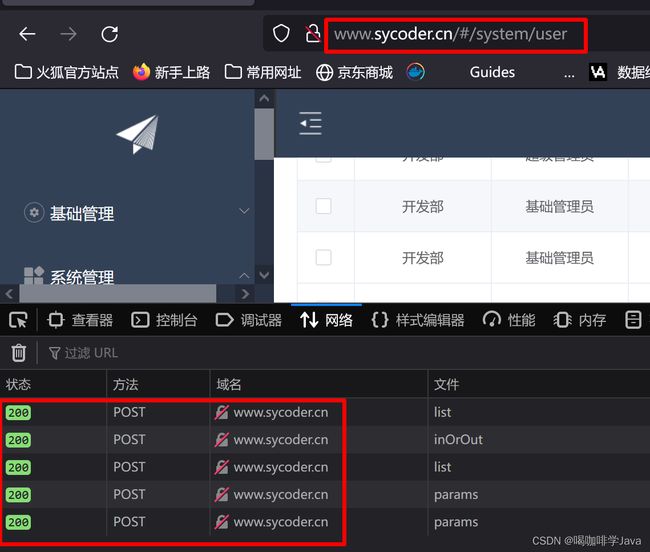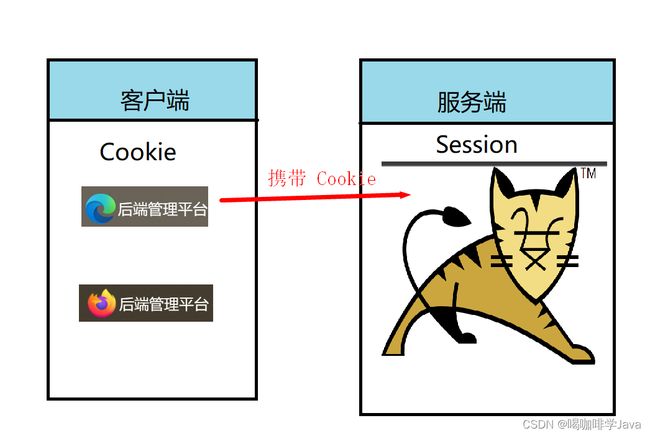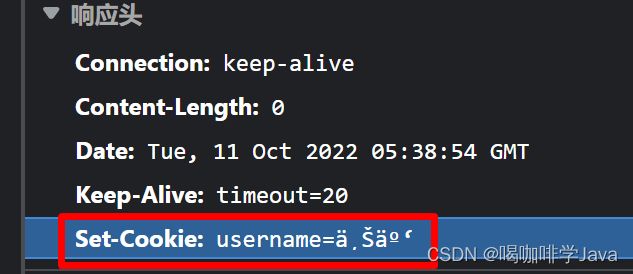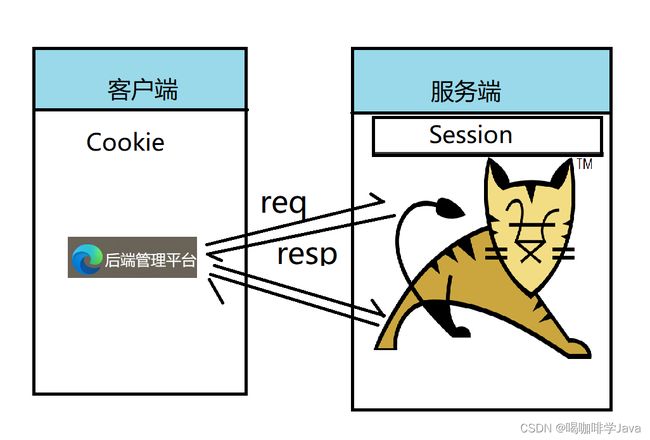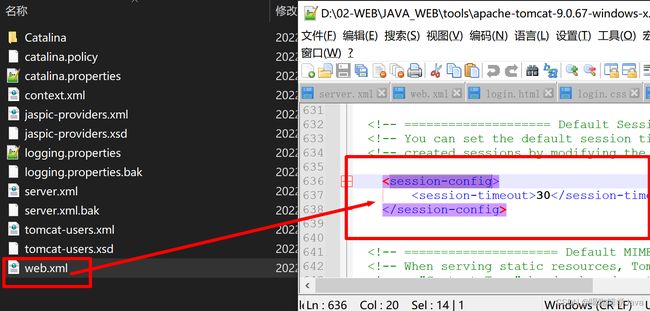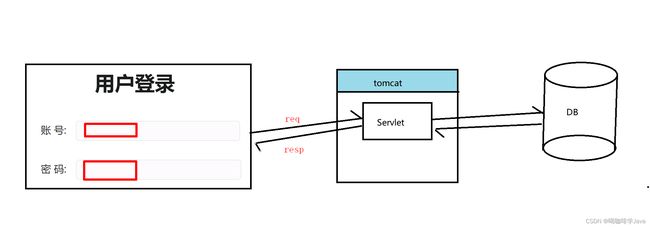Cookie和Session
一、会话
-
会话:访问浏览器,访问web服务器的资源,建立会话,直到有一方断开连接,会话结束。
-
注意:在同一会话中,可以包含多次请求
-
同一窗口发起多次请求,产生多次响应是同一会话
-
不同浏览器之间是不同会话
1.会话跟踪
-
会话跟踪技术通过什么方式实现
-
服务端技术:Session
-
客户端技术:Cookie
-
二、Cookie
1.Cookie 概述
-
Cookie:是客户端技术,可以将数据存储到客户端,然后每次请求访问的时候,都会携带 Cookie 数据访问。
2.基本使用
-
如何创建 Cookie 对象
Cookie cookie = new Cookie(String name, String value) -
响应Cookie 给客户端
void addCookie(Cookie cookie) Parameters: cookie - the Cookie to return to the client -
获取 Cookie
Cookie[] getCookies() Returns: an array of all the Cookies included with this request, or null if the request has no cookies -
Cookie 常用方法
String getName() String getValue() -
试一试
-
添加依赖
javax.servlet javax.servlet-api 3.1.0 provided javax.servlet jsp-api 2.0 provided jstl jstl 1.2 taglibs standard 1.1.2 -
编写 servlet
@WebServlet("/respCookie") public class RespCookieServlet extends HttpServlet { @Override protected void doGet(HttpServletRequest req, HttpServletResponse resp) throws ServletException, IOException { Cookie cookie = new Cookie("username", "sy"); resp.addCookie(cookie); } } -
获取 Cookie
@WebServlet("/reqCookie") public class ReqCookieServlet extends HttpServlet { public static final String USER_NAME = "username"; @Override protected void doGet(HttpServletRequest req, HttpServletResponse resp) throws ServletException, IOException { Cookie[] cookies = req.getCookies(); for (Cookie cookie : cookies) { if(ReqCookieServlet.USER_NAME.equals(cookie.getName())){ System.out.println("当前用户用户名为:"+cookie.getValue()); } } } }
-
3.Cookie 原理
-
原理分析图
-
请求 RespServlet ,添加了cookie 响应数据(username:sy),响应给浏览器
-
得到 Cookie 值之后,会将数据存储到缓存里面的Cookie 中(浏览器不一样名称也不太一样)
-
从 server(服务端) 就可以通过 getCookies 获取所有的 Cookie
4.Cookie 使用
4.1 Cookie 有效期设置
-
新打开一个浏览器已经不能使用Cookie
-
记住密码的功能是有时间限制的
-
设置 Cookie 存活时间
public void setMaxAge(int expiry) -
设置0 :删除 Cookie
Cookie cookie = new Cookie("username", "sy"); cookie.setMaxAge(0); -
Cookie cookie = new Cookie("username", "sy"); cookie.setMaxAge(24*60*60); -
负数:关闭浏览器就没
Cookie cookie = new Cookie("username", "sy"); cookie.setMaxAge(-1);
-
4.2 Cookie 使用中文
三、Session
1.Session 概述
-
Session:服务端会话跟踪技术,将数据保存到服务端。
-
Session 和 Cookie 存储区别
-
Cookie 存储到 client,容易被钓鱼网站拿过去用,有安全隐患
-
Session 存储到 Server,会相对安全
-
-
可以实现数据共享(存储会话请求的 Session ,每一次请求都可以调用(没有过期))
2.基本使用
-
获取 Session 对象(如果第一次请求没有,就创建一个)
HttpSession getSession() Returns the current session associated with this request, or if the request does not have a session, creates one. -
共享数据
-
设置值进 Session 中
void setAttribute(String name, Object value) -
从 Session 中取值
Object getAttribute(String name) -
从 Session 中删除属性
void removeAttribute(String name)
-
-
试一试
-
编写三个Servlet
@WebServlet("/reqSession") public class ReqSession extends HttpServlet { @Override protected void doGet(HttpServletRequest req, HttpServletResponse resp) throws ServletException, IOException { //获取session对象 HttpSession session = req.getSession(); //做数据共享 session.setAttribute("age",18); } }@WebServlet("/respSession") public class RespSession extends HttpServlet { @Override protected void doGet(HttpServletRequest req, HttpServletResponse resp) throws ServletException, IOException { //获取session对象 HttpSession session = req.getSession(); //做数据共享 Object age = session.getAttribute("age"); System.out.println("==============获取req 里面设置到 session 中的值"); System.out.println(age); } }@WebServlet("/removerSession") public class RemoverSession extends HttpServlet { @Override protected void doGet(HttpServletRequest req, HttpServletResponse resp) throws ServletException, IOException { //获取session对象 HttpSession session = req.getSession(); session.removeAttribute("age"); } }
-
3.Session 原理
-
Session 是基于 Cookie 实现的
-
原理分析图
-
文字说明
-
请求ReqServlet 会得到一个 Cookie (JSESSIONID=1)
-
生成一次会话 session 存储到服务端(JSESSIONID=1)
-
再次请求 RespServlet 的时候,会携带上 JESSIONID =1 去找到我们的 Session 对象
-
- 问题:凭什么通过JESSIONID 找到的 Session 对象?
4.Session 的使用
4.1Session 的钝化与活化
-
分析以下 session 使用可能出现的问题
-
第一次请求获取的Session存储到服务器之后
-
此时公司内部重启服务器
-
第二次去访问的时候,Session 已经不存在了
-
很影响用户体验感
-
-
钝化与活化的目的
-
为了存储session,保证正常关闭下正常启动的时候,同一会话有效
-
-
演示钝化与活化
-
钝化
-
服务器正常关闭的时候,tomcat 会把 session 数据写入硬盘work 目录下(sessions.ser文件)
-
-
活化
-
服务器启动的时候,tomcat 读取 sessions.ser 中的数据,并且删掉这个文件(删掉的目的是为了减少不需要的钝化文件污染磁盘,造成磁盘空间的浪费)
-
4.2Session 销毁
-
分为两种方式:自动销毁和手动销毁
-
自动销毁
-
默认情况下无操作 30分钟
-
Archetype Created Web Application 33333 -
手动销毁
void invalidate() Invalidates this session then unbinds any objects bound to it.@WebServlet("/reqSession") public class ReqSession extends HttpServlet { @Override protected void doGet(HttpServletRequest req, HttpServletResponse resp) throws ServletException, IOException { //获取session对象 HttpSession session = req.getSession(); //做数据共享 session.setAttribute("age",18); session.invalidate(); } }
-
-
四、小结(Cookie 与 Session 比较)
-
Cookie 与 Session 作用:用来在会话中做数据共享,存储数据。
| 不同点 | Cookie | Session |
|---|---|---|
| 存储位置 | client | server |
| 存储时间 | setMaxAge()可以长期存储 | 默认30分钟 |
| 存储数据大小 | 最大3KB | 无限制 |
| 安全性 | 不安全 | 安全 |
| 服务器性能影响 | 不占用服务器资源 | 占用服务器资源 |
| 应用场景 | Cookie | Session |
|---|---|---|
| 记住密码 | 使用Cookie | |
| 验证码 | 使用Session | |
| 登录名称 | Session | |
| 购物车 | 使用Cookie |
五、任务
流程分析图
-
servlet 获取前端传送的 username 和 password 数据
-
拷贝 jdbcUtil 工具类,将得到的数据和数据库比较(以三层架构的方式去做)
-
响应给浏览器
-
记住账号密码功能需要响应 cookie
-
验证码功能需要设置 session
-
登录成功之后,跳转到index.jsp 页面,并且用 h1 标签显示当前登录的用户信息
代码实现
- 新建 servlet
@WebServlet("/csLogin")
public class LoginServlet extends HttpServlet {
@Override
protected void doGet(HttpServletRequest req, HttpServletResponse resp) throws ServletException, IOException {
String username = req.getParameter("username");
String password = req.getParameter("password");
System.out.println(username);
System.out.println(password);
ILoginService service = new LoginServiceImpl();
User user = service.login(username, password);
if(user == null){
System.out.println("没有登录成功");
req.getRequestDispatcher("/login.html").forward(req,resp);
}else{
HttpSession session = req.getSession();
session.setAttribute("user",user);
resp.sendRedirect("/index.jsp");
}
}
}- 新建 service dao
public class LoginServiceImpl implements ILoginService {
@Override
public User login(String username, String password) {
User domain = JDBCUtil.getDomain(JDBCUtil.getConn(),
"select * from user where username = ? and password = ?", User.class, username, password);
return domain;
}
}- 记住账号密码
@WebServlet("/csLogin")
public class LoginServlet extends HttpServlet {
@Override
protected void doGet(HttpServletRequest req, HttpServletResponse resp) throws ServletException, IOException {
String username = req.getParameter("username");
String password = req.getParameter("password");
String remember = req.getParameter("remember");
String checkCode = req.getParameter("checkCode");
HttpSession session = req.getSession();
if ("on".equals(remember)) {
//创建 cookie
Cookie usernameCookie = new Cookie("username", username);
Cookie passwordCookie = new Cookie("password", password);
Cookie rememberCookie = new Cookie("remember", "on");
//发送 cookie
resp.addCookie(usernameCookie);
resp.addCookie(passwordCookie);
resp.addCookie(rememberCookie);
} else {
// Cookie[] cookies = req.getCookies();
// for (Cookie cookie : cookies) {
// if("username".equals(cookie.getName()) || "password".equals(cookie.getName())){
// cookie.setValue("");
// }
// }
}
System.out.println(username);
System.out.println(password);
String ret = (String) session.getAttribute("checkCode");
if (!ret.equalsIgnoreCase(checkCode)) {
req.setAttribute("check_msg", "验证码错误");
req.getRequestDispatcher("/login.jsp").forward(req, resp);
return;
}
ILoginService service = new LoginServiceImpl();
User user = service.login(username, password);
if (user == null) {
System.out.println("没有登录成功");
req.getRequestDispatcher("/login.jsp").forward(req, resp);
} else {
session.setAttribute("user", user);
resp.sendRedirect("/index.jsp");
}
}
}- 验证码
@WebServlet("/checkCode")
public class CheckCoderServlet extends HttpServlet {
@Override
protected void doGet(HttpServletRequest req, HttpServletResponse resp) throws ServletException, IOException {
//生成验证码
String code = VerifyCodeUtil.outputVerifyImage(500, 200, resp.getOutputStream(), 4);
//存储到 session 方便验证
HttpSession session = req.getSession();
session.setAttribute("checkCode",code);
}
}